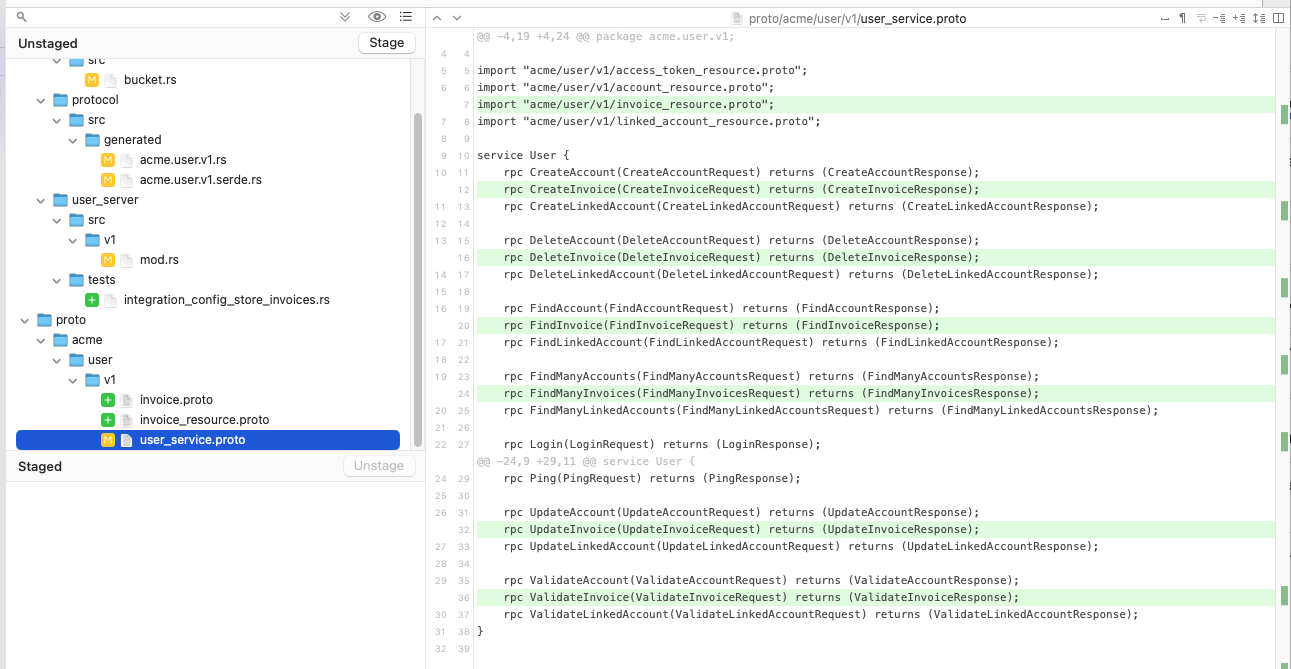The generate resource command
The generate resource command generates a model, plus its operations, including
CRUD operations and whatever else.
The command is used with arguments identical to the generate model command, like this:
$ saas-rs generate resource invoice --service user --version 1 customer_id address_1 address_2 city state zip postal_code country_iso2
$ make
$ git add -A
$ git commit -m "saas-rs generate resource invoice --service user --version 1 customer_id address_1 address_2 city state zip postal_code country_iso2"
The following content is added or changed in your Rust workspace:
crates/
├── config_store/
│ ├── src/
│ │ └── bucket.rs
├── protocol/
│ ├── src/
│ │ └── generated/
│ │ ├── acme_user_v1.rs
│ │ └── acme_user_v1_serde.rs
├── user_server/
│ ├── src/
│ │ └── v1/
│ │ └── mod.rs
│ └── tests/
│ └── integration_config_store_invoices.rs
proto/
└── acme/
└── user/
└── v1/
├── invoice.proto
├── invoice_resource.proto
└── user_service.proto
An examination of the proto/acme/user/v1/invoice_resource.proto file shows the generated default CRUD operations:
syntax = "proto3";
package acme.user.v1;
import "google/protobuf/field_mask.proto";
import "acme/user/v1/error.proto";
import "acme/user/v1/invoice.proto";
message InvoiceFilter {
optional string id = 1;
}
message CreateInvoiceRequest {
Invoice invoice = 1;
}
message CreateInvoiceResponse {
Invoice invoice = 1;
}
message DeleteInvoiceRequest {
string id = 1;
}
message DeleteInvoiceResponse {
}
message FindInvoiceRequest {
string id = 1;
}
message FindInvoiceResponse {
Invoice invoice = 1;
}
message FindManyInvoicesRequest {
InvoiceFilter filter = 1;
google.protobuf.FieldMask field_mask = 2;
optional uint32 offset = 3;
optional uint32 limit = 4;
}
message FindManyInvoicesResponse {
repeated Invoice invoices = 1;
}
message UpdateInvoiceRequest {
Invoice invoice = 1;
}
message UpdateInvoiceResponse {
Invoice invoice = 1;
}
message ValidateInvoiceRequest {
Invoice invoice = 1;
bool existing = 2;
}
message ValidateInvoiceResponse {
repeated ErrorObject errors = 1;
}
And for this new Protobuf file to be found by the Prost code generator, it needs to be referenced by the
proto/acme/user/v1/user_sevice.proto file:
import "acme/user/v1/invoice_resource.proto";
An examination of the main gRPC service implementation file at crates/user_server/src/mod.rs shows the rpc stubs
that were generated with Not Implemented Yet placeholders to ensure your workspace compiles:
impl User for UserGrpcServerV1 {
...
async fn create_invoice(
&self,
_req: Request<CreateInvoiceRequest>,
) -> Result<Response<CreateInvoiceResponse>, Status> {
todo!("NIY")
}
async fn delete_invoice(
&self,
_req: Request<DeleteInvoiceRequest>,
) -> Result<Response<DeleteInvoiceResponse>, Status> {
todo!("NIY")
}
async fn find_invoice(&self, _req: Request<FindInvoiceRequest>) -> Result<Response<FindInvoiceResponse>, Status> {
todo!("NIY")
}
async fn find_many_invoices(
&self,
_req: Request<FindManyInvoicesRequest>,
) -> Result<Response<FindManyInvoicesResponse>, Status> {
todo!("NIY")
}
async fn update_invoice(
&self,
_req: Request<UpdateInvoiceRequest>,
) -> Result<Response<UpdateInvoiceResponse>, Status> {
todo!("NIY")
}
async fn validate_invoice(
&self,
_req: Request<ValidateInvoiceRequest>,
) -> Result<Response<ValidateInvoiceResponse>, Status> {
todo!("NIY")
}
...
}A Fork based graphical diff view does the best job of showing the changes that were interleaved
into the proto/acme/user/v1/user_service.proto file:

Making Further Changes
The default CRUD code that was generated is just a starting point, and you are free to make changes to customize things to your liking. For example, you might:
- Add new operations that are above and beyond the usual CRUD operations
- Customize the pagination mechanism used by the find many operation
- Customize the fields that can be filtered on during find many operations
- Remove Delete and Update operations for resources that will be read-only, such as static lookup tables. The SaaS RS
CLI does this for the
saas-rs list generatorscommand, which returns a static list ofGeneratorrecords:
$ saas-rs list generators
┌──────────────────────┬─────────┬────────────────┬─────────────────────────────────┐
│ id ┆ type ┆ name ┆ description │
│ --- ┆ --- ┆ --- ┆ --- │
│ str ┆ str ┆ str ┆ str │
╞══════════════════════╪═════════╪════════════════╪═════════════════════════════════╡
│ d18nptv1t0sfku8vjl00 ┆ Feature ┆ api-keys ┆ Adds API Key management and au… │
│ d126jjn1t0s8usbjajpg ┆ Feature ┆ file-transfer ┆ Adds file upload+download capa… │
│ d1bc0dv1t0sda0dg0la0 ┆ Feature ┆ issue-tracking ┆ Adds issue tracking support to… │
│ d1bc2uf1t0sdd7jbftmg ┆ Feature ┆ service-broker ┆ Adds service broker support to… │
└──────────────────────┴─────────┴────────────────┴─────────────────────────────────┘